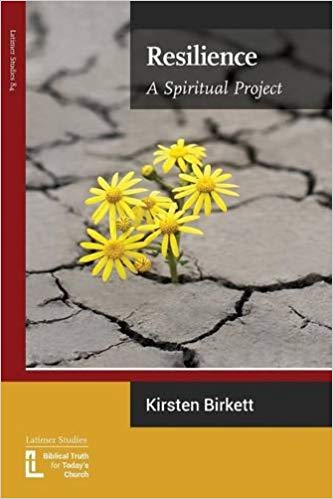Resilience and burnout are big issues in work and ministry at present. In the field of Christian ministry the statistics of burnout seem alarmingly high and the focus on building resilience is both urgent and important. Kirsten Birkett has provided a great service by sharing her research into these areas in her latest book Resilience: A Spiritual Project. This isn’t a popular level book. For a start, it’s published by The Latimer Trust, as the 84th of their brief academic studies. While only being 46 pages in length, it includes another 9 pages of bibliography, comprising mainly of academic journal articles. But don’t let these things put you off. Resilience: A Spiritual Project is compact, yet thorough, and I found it engaging and easy to read. While much of her book is surveying and summarising findings in the literature, Dr Birkett draws us to practical conclusions with profound pastoral implications.
Dr Birkett writes as an experienced researcher, academic, author, and teacher. However, she does this in sync with her experience of grappling with burnout herself, and with an eye to equipping men and women in pastoral ministry
Dr Birkett writes as an experienced researcher, academic, author, and teacher. However, she does this in sync with her experience of grappling with burnout herself, and with an eye to equipping men and women in pastoral ministry. She understands the particular dangers and threats for those engaged in a profession where resilience is needed to fuel perseverance and endurance. Most profoundly, Dr Birkett draws on the wisdom of the research to argue that resilience ‘can be learned’ and ‘people can be trained against future stress’ (p17). She is also careful to emphasise that resilience is not a cure-all. Sometimes people are simply tired and need to slow down, rest, or take time out. Other times people are overwhelmed by sadness, grief, or trauma, and just need time to weep and mourn. However, she writes:

Resilience: A Spiritual Project (Latimer Studies)
Kirsten Birkett
If we keep resilience in perspective, as ways of helping healthy people stay healthy and of helping ill people recover, it seems to be an extremely useful construct. Human beings are resilient — we could hardly have survived this long otherwise. (p25)
Dr Birkett demonstrates in her book that there are significant overlaps between resilience research and Christian spirituality. Many features identified in the literature as important in building resilience, find expression in biblical expressions of Christian faith in action. She examines the following areas:
- Adversity leads to strength
- Sense of meaning and purpose
- Transcendence
- Hope and optimism and positive emotions
- Altruism
- Self-efficacy: God efficacy
- Forgiveness
- Social network
If you have a good understanding of the life of a Christian then you will hear the resonance already.
We believe that God works to strengthen and transform his people through adversity. Suffering is not to be sought after, but it is to be expected. ‘What people need, it seems, is not a stress-free life, but the framework to treat stress well; to use it as a stimulus for growth, rather than buckling under it’ (p33).
We believe that we have been created for a purpose, essentially for Jesus Christ (Colossians 1:16). We are not the product of chance and time. There is meaning, purpose, significance, and eternity. We may not always understand our suffering but God, in his wisdom, uses it to produce good (Romans 8:18,28).
We believe, not in some external transcendent force, but in a God who is accessible and invites us to come to him in our times of need. God has come to us in the incarnation of Jesus. God dwells in and among his people by his Spirit. We have access to God through the death and resurrection of his Son, and so we are invited to come before him in prayer, and present our requests to him rather than staying isolated in our anxiety.
We believe there is good reason for hope. Our faith is built on hope in the promises of God. God has shown he is faithful in Christ Jesus and because of this we can have joy even in the midst of suffering (1 Peter 1:3-7).
We have a deep reason to love others. We did nothing to deserve it, but God has loved us, at enormous cost, through the atoning death of Jesus. This leads to a purposeful altruism, motivated by God’s work in and through us. At the heart of this is power and willingness to forgive those who have wronged us. We can shed our anger and avoid bitterness.
We believe, not in self-efficacy, but in the efficacy of God. There is honesty in Christian understanding that we are not equal to all tasks. We don’t need to be demoralised by our continual sub-par performances. We’re not required to grow superpowers. Our sovereign God knows our needs and will accomplish his purposes for our good. This is stress-relieving.
We believe that God has given us a community. We are adopted into his family and called to love our brothers and sisters. Hospitality and care are part of the fabric of our relationships.
You see, in other words, God is in the business of building resilience in his people. How then should we train Christian ministers for resilience? Dr Birkett nails it with her insight:
It would seem we do so by training them to be Christian. (p38)
Read that again! Building resilience comes from Christian discipleship.
God is in the business of building resilience in his people. Building resilience comes from Christian discipleship.
Building resilience in Christian leaders isn’t simply the domain of Christian psychologists, as important and as helpful as they can be. It should be the fruit of putting a deepening understanding of God and his ways into practice. It should come as we soak ourselves in the Scriptures and turn to God in prayer. Resilience should be the outworking of good doctrine and faith working itself out in love. There are no silver bullets—no secret elixirs—when it comes to avoiding burnout. But, as God’s children, we have a Father in heaven who knows us, loves us, guides us, equips us, heals us, and sustains us. Let’s turn to him in our hour of need.
Resilience: A Spiritual Project is a word in season.
First published at https://macarisms.com















